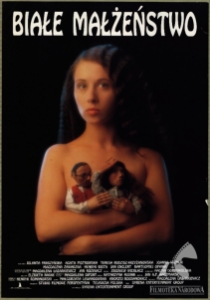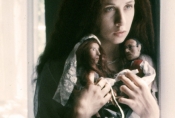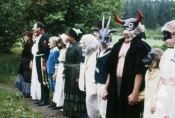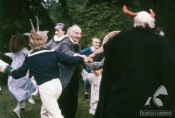WHITE MARRIAGE [1992]

year:
- 1992
release date:
- 26 III 1993
runtime:
- 93 min
directed by:
- Magdalena Łazarkiewicz
written by:
- Magdalena Łazarkiewicz, Jan Różewicz [based on a play by Tadeusz Różewicz]
director of photography:
- Zbigniew Wichłacz
cast:
- Jolanta Fraszyńska [Bianka], Agata Piotrowska [Paulina], Teresa Budzisz-Krzyżanowska [the mother of the girls], Jan Englert [Wincenty, the father of the girls], Magdalena Zawadzka [aunt Aniela], Henryk Bista [the grandfather], Joanna Wizmur [a cook], Bartosz Opania [Beniamin], Tomasz Lulek [an officer], Ewa Ziętek [the chief cook], Bohdana Majda [Beniamin’s aunt], Jacek Wójcicki [a singer], Edward Wojtaszek [an uhlan], Grzegorz Skurski [operator of the legionnaires], Andrzej Mastalerz [the operator’s assistant]
edited by:
- Katarzyna Rudnik-Glińska
music by:
- Jan A.P. Kaczmarek
production design:
- Halina Dobrowolska
produced by:
- Studio Filmowe „Perspektywa”, Telewizja Polska, Syrena Entertainment Group
executive producer:
- Henryk Romanowski
awards:
-
- Syrenka Warszawska 1992
About the film
Two teenage girls, Bianka and Paulina, watch a film on the sex life of people and animals in their country manor. Surprised by the father of Bianca, they switch the TV to another channel. Suddenly, they find themselves in the same manor, but in the 1920s.
The girls are going through puberty and are therefore experiencing all the problems it entails. The atmosphere in the manor where they live, which includes a virile father, a widowed aunt and a grandfather who is always trying to seduce women, is steeped in eroticism. Bianka is very anxious about her upcoming marriage with Beniamin, who is completely indifferent to her and it breaks her personality. Paulina, who is very rational, coquettish, and already awoken sexually, is jealous of Bianka’s fiancé. Bianka symbolises the Romantic model of a woman-angel, but has not the slightest desire to make sacrifices, while Paulina comes to terms with her own physicality. The confrontation of the feelings and thoughts of the girls leads to the breakdown of the more vulnerable one as Bianka succumbs to madness.
A young girl defying generally accepted morality cannot find a place for herself in life.
Agnieszka Czachowska, Leksykon polskich filmów fabularnych, Warszawa 1996










